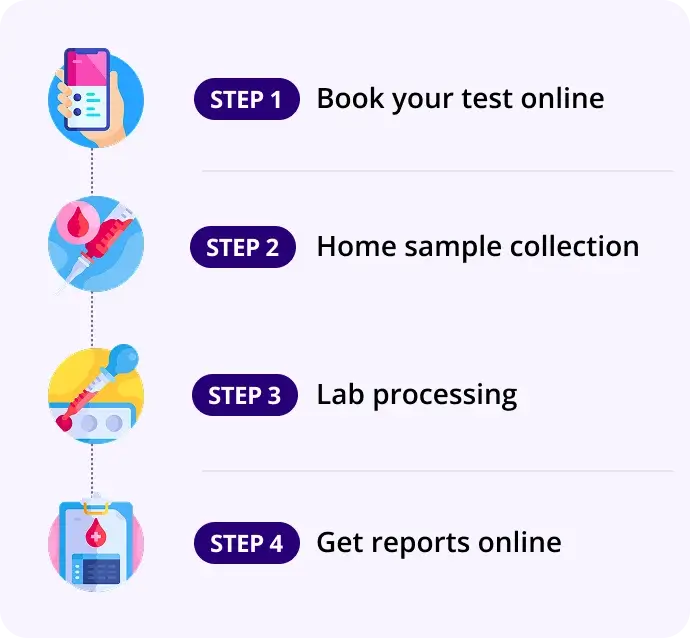Search for
Cystatin - C
Kidney
Report in 48Hrs
At Home
No Fasting Required
Details
Biomarker for kidney function—especially for detecting early decline in glomerular filtration rate (GFR)
₹1,647₹2,745
40% OFF
FREE:
Ai Insights
Cystatin C - Comprehensive Medical Test Information Guide
- Why is it done?
- Test Measurement: Cystatin C is a protein produced at a constant rate by all nucleated cells in the body. This test measures the level of cystatin C in the blood to assess kidney function and glomerular filtration rate (GFR).
- Primary Indications: Screening for early kidney disease detection Monitoring kidney function in patients with known renal disease Assessing glomerular filtration rate when serum creatinine may be unreliable Evaluating drug clearance and dosing adjustments Detecting acute kidney injury
- Typical Timing: Ordered at routine health examinations, during metabolic workups, or when kidney disease is suspected Performed in patients taking nephrotoxic medications Used in serial monitoring to track kidney function changes over time
- Normal Range
- Reference Values: Normal range: 0.6 - 1.2 mg/L (or 0.55 - 1.04 mg/L depending on laboratory) Values may vary slightly between laboratories based on assay methodology Units: mg/L (milligrams per liter) or mg/dL
- Result Interpretation: Normal (Low): 0.6 - 1.2 mg/L indicates normal kidney function with adequate glomerular filtration Elevated (High): >1.2 mg/L suggests reduced kidney function and decreased GFR Borderline: 1.0 - 1.2 mg/L may warrant further evaluation
- Clinical Significance: Normal results: Reflect preserved kidney function and adequate filtration ability Abnormal results: Indicate impaired kidney function requiring further investigation and management
- Interpretation
- Result Value Analysis: 0.6 - 1.2 mg/L (Normal): Normal kidney function, GFR >60 mL/min/1.73m² 1.2 - 2.0 mg/L (Mildly Elevated): Early kidney disease, GFR 45-59 mL/min/1.73m² (Stage 2) 2.0 - 3.0 mg/L (Moderately Elevated): Moderate kidney disease, GFR 30-44 mL/min/1.73m² (Stage 3a) 3.0 - 4.0 mg/L (Significantly Elevated): Advanced kidney disease, GFR 15-29 mL/min/1.73m² (Stage 4) >4.0 mg/L (Severely Elevated): End-stage renal disease, GFR <15 mL/min/1.73m² (Stage 5)
- Clinical Implications: Elevated levels indicate progressive loss of kidney filtration capacity More sensitive than serum creatinine for detecting early kidney disease Better marker in elderly patients, obese individuals, and those with reduced muscle mass Cystatin C is less affected by diet and muscle mass compared to creatinine
- Factors Affecting Results: Corticosteroid use (may decrease levels) Thyroid disorders (hyperthyroidism increases, hypothyroidism decreases levels) Malignancy and inflammation (may elevate levels) Age-related changes (slight increases with age) Pregnancy and immobility (may affect results) Rarely affected by diet or exercise
- Clinical Significance Patterns: Progressive elevation: Indicates worsening kidney function requiring intensified management Stable results: Suggest stable kidney disease without acute deterioration Acute elevation: May indicate acute kidney injury requiring immediate intervention Discordant with creatinine: Cystatin C alone suggests early kidney disease not yet reflected in creatinine
- Associated Organs
- Primary Organ System: Kidneys (Renal System) - The test directly assesses kidney filtration function through measurement of cystatin C clearance
- Associated Medical Conditions: Chronic Kidney Disease (CKD) - Elevated cystatin C indicates reduced glomerular filtration Acute Kidney Injury (AKI) - Rapid elevations suggest acute loss of kidney function Diabetic Nephropathy - Early marker of kidney damage in diabetes patients Hypertensive Nephrosclerosis - Progressive kidney damage from high blood pressure Glomerulonephritis - Inflammatory kidney disease affecting filtration Polycystic Kidney Disease - Genetic kidney disorder with progressive function loss Lupus Nephritis - Autoimmune kidney involvement in systemic lupus erythematosus Obstruction-Related Kidney Disease - From stones, tumors, or strictures
- Diagnostic Applications: Detects early-stage chronic kidney disease before symptoms appear Monitors progression of known kidney disease Identifies patients at risk for cardiovascular complications Guides medication dosing adjustments for renally cleared drugs Screens for kidney involvement in systemic diseases
- Potential Complications Associated with Abnormal Results: Electrolyte imbalances (potassium, sodium, phosphorus abnormalities) Mineral bone disease and secondary hyperparathyroidism Anemia from reduced erythropoietin production Cardiovascular disease and hypertension progression Metabolic acidosis Uremia and its complications Progression to end-stage renal disease requiring dialysis or transplantation Increased risk of mortality
- Follow-up Tests
- Recommended Follow-up Testing: Serum Creatinine - Compare with cystatin C to calculate eGFR using both markers Blood Urea Nitrogen (BUN) - Assess nitrogenous waste clearance Basic Metabolic Panel (electrolytes, glucose) - Evaluate kidney and metabolic function Urinalysis - Detect proteinuria, hematuria, or casts indicating kidney disease Urine Albumin-to-Creatinine Ratio (UACR) - Quantify proteinuria and assess kidney damage Phosphorus and Calcium - Monitor mineral metabolism abnormalities Parathyroid Hormone (PTH) - Assess secondary hyperparathyroidism Complete Blood Count (CBC) - Evaluate for anemia of chronic kidney disease Lipid Panel - Assess cardiovascular risk in kidney disease
- Further Investigations: Renal Ultrasound - Assess kidney size, structure, and presence of obstruction Renal Doppler Ultrasound - Evaluate renal artery stenosis CT or MRI - Detailed imaging for complex kidney pathology Renal Biopsy - Definitive diagnosis when kidney disease etiology unclear 24-Hour Urine Collection - Assess total protein excretion and GFR Cystatin C-based eGFR Calculation - Combined with creatinine for improved accuracy
- Monitoring Frequency: Stage 1 CKD: Annually or every 2 years Stage 2 CKD: Annually or every 1-2 years Stage 3 CKD: Every 6-12 months Stage 4 CKD: Every 3-6 months Stage 5 CKD: Monthly or as clinically indicated Acute kidney injury: Serial testing as needed to assess trends Post-intervention: Follow-up at 1-2 weeks, then as indicated
- Complementary Testing: Combination with serum creatinine for eGFR calculation improves accuracy Cystatin C plus creatinine better predicts kidney disease progression than either alone Beta-2 microglobulin testing provides alternative filtration marker when needed Homocysteine measurement in CKD patients for cardiovascular risk assessment ProBNP or BNP for cardiac function assessment in advanced kidney disease
- Fasting Required?
- Fasting Status: No - Fasting is NOT required for Cystatin C testing
- Dietary Considerations: Food and fluid intake do not affect cystatin C levels Test can be performed at any time of day No dietary restrictions apply to this test Normal meals and beverages may be consumed prior to testing
- Medications: Continue all regular medications as prescribed Do not stop or modify medication regimen prior to testing ACE inhibitors, ARBs, and diuretics should be continued Inform healthcare provider of all medications being taken Corticosteroid use should be documented as it may affect results
- Other Patient Preparation: Maintain normal hydration status Blood draw can be performed at any time of day No special clothing needed, wear comfortable clothing for easy blood draw access Arrive on time to avoid prolonged waiting or stress Relax for 5 minutes before blood draw if possible Inform phlebotomist of any bleeding disorders or anticoagulant use No exercise restrictions or specific activity limitations Patient can resume normal activities immediately after blood draw
How our test process works!

